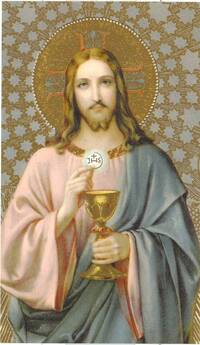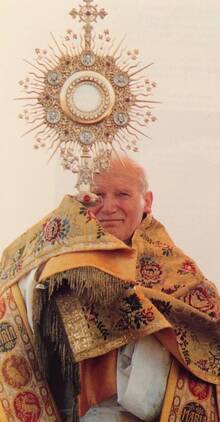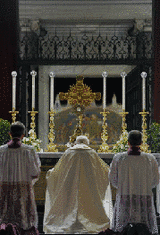Corpus Christi
The Most Precious Body and Blood of Jesus Christ
Feast Day - Thursday after Trinity Sunday
(some countries have transferred this feast to the following Sunday)
Pope Francis's words in: 2020, 2019, 2018, 2017, 2016, 2015, 2014 & 2013 (in this Year of Faith there was a Holy Hour of Eucharistic Adoration around the world).
Benedict XVI's words in: 2012, 2011, 2010, 2009, 2008, 2007, 2006 & 2005
Saint John Paul II's words in: 2004, 2003, 2002, 2001, Great Jubilee 2000, 1999, 1998, 1997, 1996, 1995, 1994, 1993, 1992, 1991, 1990, 1989, 1988, 1987, 1986, 1985, 1984, 1983, 1982, 1981, 1980 & 1979.
Encyclicals on the Eucharist:
Ecclesia de Eucharistia - Pope St John Paul II's last encyclical
Mysterium Fidei (Mystery of Faith) - Pope St Paul VI's third encyclical
Mirae Caritatis - Pope Leo XIII's 83rd encyclical
Much more here on the Most Holy Sacrament of the Altar. Plus there's Totus2us's podcast on the Eucharist: In Memory of Me.
3 2us with Fr Anthony Doe ![]()
"This is really what the meaning of the Eucharist is - being brought alive first of all by the intimate love that Jesus has for our humanity, uniting himself to us in our woundedness but also our great capacity to be free and to love like He loves. And then, through the presence of Jesus within us, mysteriously He opens our spirit up to the love of the Father."
Pope St John Paul II's Catechesis on Corpus Christi 
General Audience, Wednesday 13 June 1979 - also in French, Italian, Portuguese & Spanish
"1. "Pange, lingua, gloriosi / Corporis mysterium / Sanguinisque pretiosi..." (St Thomas, Hymn at I Vespers of the Solemnity of the Most Holy Body and Blood of Christ).
The day is approaching, and it has already practically begun, on which/when the Church will speak, through her solemn liturgy, with veneration of this mystery which she lives every day: the Eucharist. "Gloriosi Corporis mysterium Sanguinisque pretiosi", "mystery of the glorious Body and precious Blood". The foundation and, at the same time, the culmination (cf Sacrosanctuum Concilium, 10) of the life of the Church. Her unceasing feast and, at the same time, her "holy daily life".
Every year Holy Thursday, the beginning of the Holy Triduum, reunites us in the cenacle, where we celebrate the Memorial of the Last Supper. And precisely this day would be the most suitable to meditate with veneration on all that which the Eucharist, the Sacrament of the Body and Blood of the Lord, constitutes for the Church. However it has been seen in the course of history that this most suitable, one day is not enough. It is, moreover, organically included in the paschal memory as a whole; then the whole of the Passion, Death and Resurrection occupy our thoughts and our hearts. Hence we cannot say everything about the Eucharist, of which our hearts are full of. Therefore from the Middle Ages, and precisely from 1264, the need for adoration, both liturgical and public, of the Blessed Sacrament has found expression in a separate solemnity, which the Church celebrates on the first Thursday after the Sunday of the Most Holy Trinity, that is, precisely tomorrow, beginning with the first vespers of the preceding day, that is, today.
I desire that this meditation introduce us into the full atmosphere of the eucharistic feast.
2. "Non est alia natio tam grandis, quae habeat deos appropinguantes sibi, sicut Deus noster adest nobis". There is no other nation so great that has the Divinity so close, as our God is present to us" (St Thomas, Officium SS. Corporis Christi, II Nocturn; cf Opusc. 57).
One can speak about the Eucharist in different ways. In the course of history it has already been spoken about in different ways. It is difficult to say something that has not already been said. And at the same time, whatever one says about it, from whatever angle we approach this great Mystery of the faith and the life of the Church, we always discover something new. Not because our words reveal this novelty. It is found in the Mystery itself. Every attempt to live with it in the spirit of faith brings with it new light, new amazement and new joy.
"And marvelling at this and considering the sublimity of divine love..., the son of thunder exclaimed: `God loved the world so much' ... (Jn 3, 16). Tell us, therefore, O blessed John, in what sense "so much"? Tell us the measure, tell us the greatness, teach us the sublimity. God loved the world so much ..." (St John Chrysostom, In cap. Genes, VIII Homilia XXVII, 1).
The Eucharist brings us closer to God in an amazing way. And it is the Sacrament of his closeness in respect of man. God in the Eucharist is precisely this God who wanted to enter into the history of man. He wanted to accept humanity itself. He wanted to become man. The Sacrament of the Body and Blood reminds us continually of his divine humanity.
We sing "Ave, verum corpus, natum ex Maria Virgine". And by living with the Eucharist, we find again all the simplicity and depth of the mystery of Incarnation.
It is the Sacrament of God's descent to man, of his approach to all that is human. It is the Sacrament of divine "condescension" (cf St John Chrysostom, In Genes 3, 8: Homilia XXVII, 1). The divine entry into human reality reached its culmination through the passion and death. Through his passion and death on the Cross, the Son of God Incarnate became, in a particularly radical way, the Son of Man, he shared right to the end that which is the condition of every man. The Eucharist, Sacrament of the Body and Blood, reminds us above all of this death, which Christ suffered on the cross; it reminds and, in a certain way, that is bloodless, renews its historical reality. This is testified by the words spoken in the cenacle about the bread and the wine separately, the words which, by Christ's institution, realise the Sacrament of his Body and his Blood; the Sacrament of his death, which was expiatory sacrifice. The Sacrament of his death, in which all the power of love was expressed. The Sacrament of his death, which consisted in giving his life so as to reconquer the fullness of life.
"Manduca vitam, bibe vitami: habebis vitam, et integra est vita ("Eat life, drink life: you will have life, and life in its entirety") (St Augustine, Sermones ad populum, Series 1, Sermo CXXXI I, 1).
Through this Sacrament, the death which gives life is continually announced, in the history of man (cf 1 Cor 11, 26).
It is continually realized in this very simple sense, which is the sign of the Bread and Wine. God is present in it and close to man with that penetrating closeness of his death on the cross, from which sprang the power of the Resurrection. Man, through the Eucharist, becomes a participant in this power.
3. The Eucharist is Sacrament of Communion. Christ gives his very self to each of us, who receive him under the eucharistic species. He gives his very self to each of us, who eat the eucharistic Food and drink the eucharistic Drink. This eating is sign of Communion. It is sign of spiritual union, in which man receives Christ, is offered participation in his Spirit, finds in him in a particularly intimate way the relationship with the Father; feels particularly close the access to him.
A great poet (Mickiewocz. Evening Talks) says: "With you I speak, who reign in heaven and at the same time are a guest/ in the house of my spirit... / With you I speak! I do not have words for you; / your thought listens to my every thought; / you reign far away and serve right here, / King in heaven and in my heart on the cross...".
Indeed we approach eucharistic Communion by first reciting the "Our Father".
Communion is a bilateral bond. We should therefore say that not only do we receive Christ, not only does each of us receive him in this eucharistic sign, but also that Christ receives each of us. In this Sacrament, He always, so to speak, accepts man, makes him his friend, as he said in the cenacle: "You are my friends" (Jn 15, 14). This welcome and acceptance of man on the part of Christ is an unheard of benefit. Man feels very deeply the desire to be accepted. The whole life of man is turned in this direction, that he may be welcomed and accepted by God; and the Eucharist expresses this sacramentally. Yet, as St Paul says, man must "examine himself" (cf 1 Cor 11, 28), to see if he is worthy of being accepted by Christ. The Eucharist is, in a certain sense, a constant challenge to man to seek to be accepted, to adapt his conscience to the demands of the most holy, divine Friendship.
4. In the framework of today's solemnity, as well as on next Sunday and every day, we desire to express this particular, public veneration and love, with which we always surround the Most Holy Sacrament. Allow my thoughts, at this moment, to turn once again to Poland, from whence I returned a few days ago. They were days of a particular pilgrimage in the land where I was born and educated, among men to whom I do not cease to be attached by the deepest bonds of faith, hope and charity. I desire, once more, to thank most cordially all my fellow countrymen. I thank the state Authorities; I thank my Brothers in the Episcopate; I thank everyone.
Well! It was precisely there, in my native land, that I learned fervent veneration and love for the Eucharist. There I learned the cult for the Body of the Lord. For centuries, on the feast of "Corpus Domini" eucharistic processions have been held, in which my fellow-countrymen have sought to express communally and publicly what the Eucharist represents for them. And they do so still today. Hence I unite myself to them spiritually, while for the first time I have the joy of celebrating the solemnity of the Body and the Blood of Christ here, in the Eternal City, in which Peter, from generation to generation, responds in a certain way to Christ: "Lord .. you know that I love you.. Lord you know that I love you" (Jn 21, 15-17). The Eucharist is, in a certain way, the culminating point of this response. I desire to repeat it together with the whole Church to Him, who has manifested his love through the Sacrament of his Body and Blood, remaining with us "until the end of the world" (Mt 28, 20)."
Before concluding his audience, the Holy Father added:
"I cannot conceal from you, dearest Brothers and Sisters, the feeling of acute and profound sorrow which I experienced in my heart on learning the grave news of the expulsion of 70 missionaries from the Republic of Burundi last week while I was in Poland. They are priests, sisters and laity of missionary institutes and enterprises, known and esteemed for their commitment to evangelization in the whole world. My solidarity is, above all, for the Catholic communities of the dioceses, and in the first place for their pastors, suddenly deprived of valuable qualified help in various sectors of pastoral life, of the training of the clergy, of schools and works of charity and of human advancement. My affectionate thought goes out to those missionaries uprooted from the Lord's vineyard to which they were dedicated.
Likewise I am profoundly saddened by the thought that the Church, universal in her mission and in her concern for all peoples, and which, even in the midst of difficulties, can never cease "to feel herself at home" in any country of the world — Burundi, moreover, has a considerable Catholic population — has not had time to examine in what matter someone may have failed — if there has been a failure — in the loyalty and respect which our religious mission demands and which we observe everywhere in regard to civil authorities and institutions. If it should happen that someone has not behaved well, I think that the Church Authority has reason to expect confidence on the part of the civil Authority, and all the more so if the Church has official relations with the latter. The Church has given proof of a spirit of collaboration and can, if necessary, intervene and correct, while on her part she cannot but rely on a spirit of understanding and of dialogue of the civil Authorities.
Dearest children, pray with me that there may be preserved for the Church in Burundi the spiritual help of the missionaries, that the wound may be healed and dialogue resumed, and that it may develop to the advantage of the Catholic community and of the entire nation of Burundi which is so dear to me."
Evangelium with Fr Andrew Pinsent ![]()
"This is the day in the liturgical year when we celebrate the most extraordinary gift that God has given to us: God in His love and mercy gives us Himself, under the appearances of bread and wine."
Evangelium with Fr Andrew Pinsent ![]()
"Now love is intimately connected with sacrifice, the notion of a sacrifice being associated with an outpouring of something that is precious to oneself for the sake of another person. So in the Mass, God gives us not only the opportunity to participate in the strength of God by means of a sacrament, but also in the love of God by means of a sacrifice. More specifically, in the Mass we participate in the perfect sacrifice, that of Christ on the cross in which the Son of God gave His life to save us."
'On the feast of Corpus Christi' by St Thomas Aquinas
O precious and wonderful banquet!
Since it was the will of God’s only-begotten Son that men should share in his divinity, he assumed our nature in order that by becoming man he might make men gods. Moreover, when he took our flesh he dedicated the whole of its substance to our salvation. He offered his body to God the Father on the altar of the cross as a sacrifice for our reconciliation. He shed his blood for our ransom and purification, so that we might be redeemed from our wretched state of bondage and cleansed from all sin. But to ensure that the memory of so great a gift would abide with us for ever, he left his body as food and his blood as drink for the faithful to consume in the form of bread and wine.
O precious and wonderful banquet, that brings us salvation and contains all sweetness! Could anything be of more intrinsic value? Under the old law it was the flesh of calves and goats that was offered, but here Christ himself, the true God, is set before us as our food. What could be more wonderful than this? No other sacrament has greater healing power; through it sins are purged away, virtues are increased, and the soul is enriched with an abundance of every spiritual gift. It is offered in the Church for the living and the dead, so that what was instituted for the salvation of all may be for the benefit of all. Yet, in the end, no one can fully express the sweetness of this sacrament, in which spiritual delight is tasted at its very source, and in which we renew the memory of that surpassing love for us which Christ revealed in his passion.
It was to impress the vastness of this love more firmly upon the hearts of the faithful that our Lord instituted this sacrament at the Last Supper. As he was on the point of leaving the world to go to the Father, after celebrating the Passover with his disciples, he left it as a perpetual memorial of his passion. It was the fulfilment of ancient figures and the greatest of all his miracles, while for those who were to experience the sorrow of his departure, it was destined to be a unique and abiding consolation.


